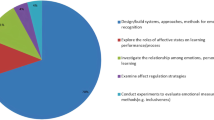Abstract
This paper describes a novel research approach for affective reasoning that aims at recognizing user emotions within an educational application. The novel approach is based on information about users that arises from two modalities (keyboard and microphone) and is processed based on a combination of the user stereotypes theory and a decision making theory. The resulting system is called Educational Affective Tutor (EAT). EAT is an educational system that helps students learn geography and supports bi-modal interaction. The main focus of this paper is to show how affect recognition is designed based on and empirical study aimed at finding common user reactions that expressed user feelings while they interacted with computers.
Access this chapter
Tax calculation will be finalised at checkout
Purchases are for personal use only
Preview
Unable to display preview. Download preview PDF.
Similar content being viewed by others
References
Picard, R.W.: Affective Computing: Challenges. Int. Journal of Human-Computer Studies 59(1-2), 55–64 (2003)
Moriyama, T., Ozawa, S.: Measurement of Human Vocal Emotion Using Fuzzy Control. Systems and Computers in Japan 32(4) (2001)
Moriyama, T., Saito, H., Ozawa, S.: Evaluation of the Relation between Emotional Concepts and Emotional Parameters in Speech. Systems and Computers in Japan 32(3) (2001)
Pantic, M., Rothkrantz, L.J.M.: Toward an affect-sensitive multimodal human-computer interaction. Proceedings of the IEEE 91, 1370–1390 (2003)
Kay, J.: Stereotypes, student models and scrutability. In: Gauthier, G., Frasson, C., VanLehn, K. (eds.) ITS 2000. LNCS, vol. 1839, pp. 19–30. Springer, Heidelberg (2000)
Rich, E.: Users are individuals: individualizing user models. International Journal of Man-Machine Studies 18, 199–214 (1983)
Fishburn, P.C.: Additive Utilities with Incomplete Product Set: Applications to Priorities and Assignments. Operations Research (1967)
Hwang, C.L., Yoon, K.: Multiple Attribute Decision Making: Methods and Applications. Lecture Notes in Economics and Mathematical Systems, vol. 186. Springer, Heidelberg (1981)
Alepis, E., Virvou, M., Kabassi, K.: Knowledge Engineering for Affective Bi-modal Human-Computer Interaction, Sigmap (2007)
Alepis, E., Virvou, M.: Emotional Intelligence: Constructing user stereotypes for affective bi-modal interaction. Lecture notes in Computer Science, pp. 435–442. KES (2006)
Stathopoulou, I.O., Tsihrintzis, G.A.: Detection and Expression Classification System for Face Images (FADECS). In: IEEE Workshop on Signal Processing Systems, Athens, Greece (2005)
Author information
Authors and Affiliations
Editor information
Rights and permissions
Copyright information
© 2008 Springer-Verlag Berlin Heidelberg
About this chapter
Cite this chapter
Alepis, E., Virvou, M., Kabassi, K. (2008). Affective Reasoning Based on Bi-modal Interaction and User Stereotypes. In: Tsihrintzis, G.A., Virvou, M., Howlett, R.J., Jain, L.C. (eds) New Directions in Intelligent Interactive Multimedia. Studies in Computational Intelligence, vol 142. Springer, Berlin, Heidelberg. https://doi.org/10.1007/978-3-540-68127-4_54
Download citation
DOI: https://doi.org/10.1007/978-3-540-68127-4_54
Publisher Name: Springer, Berlin, Heidelberg
Print ISBN: 978-3-540-68126-7
Online ISBN: 978-3-540-68127-4
eBook Packages: EngineeringEngineering (R0)




